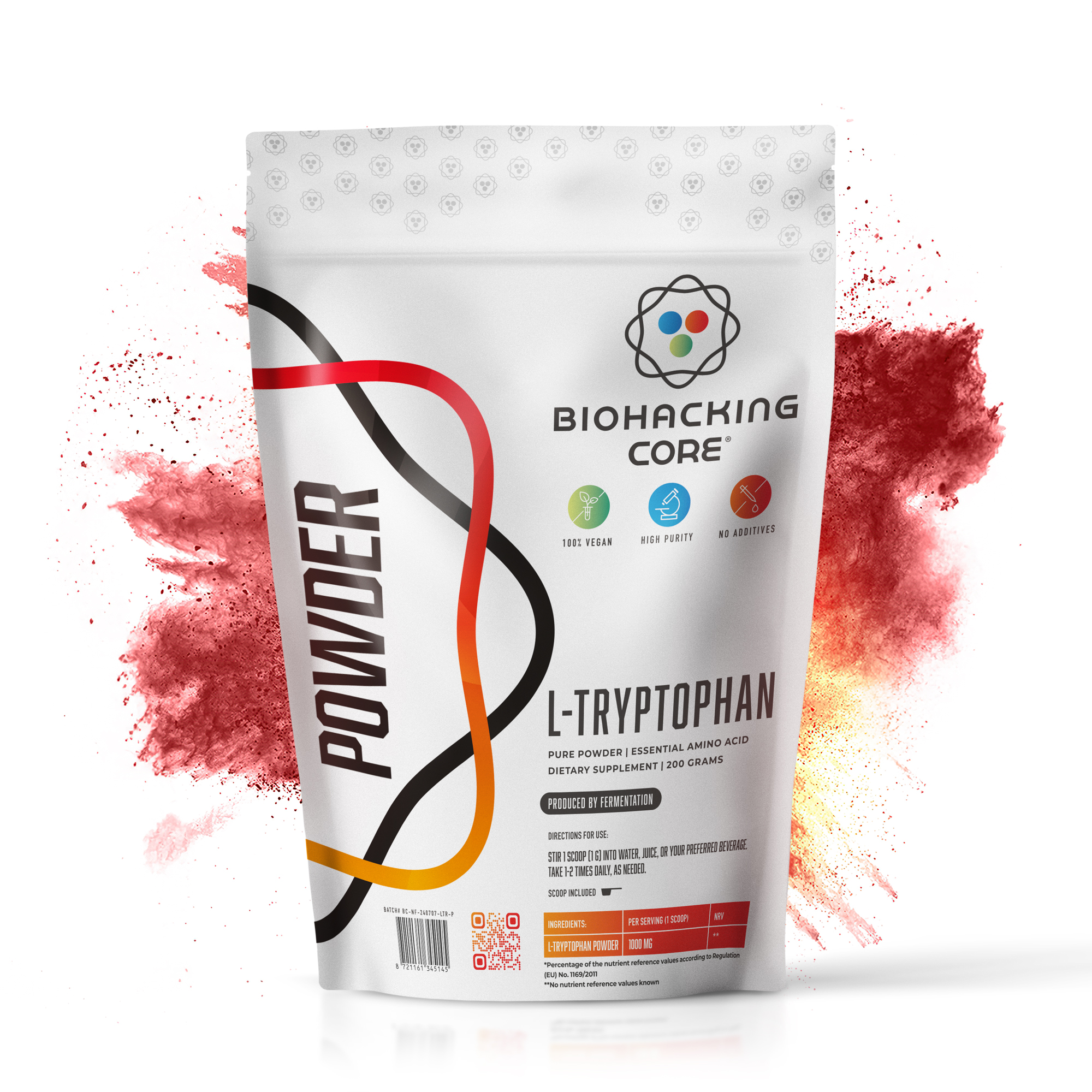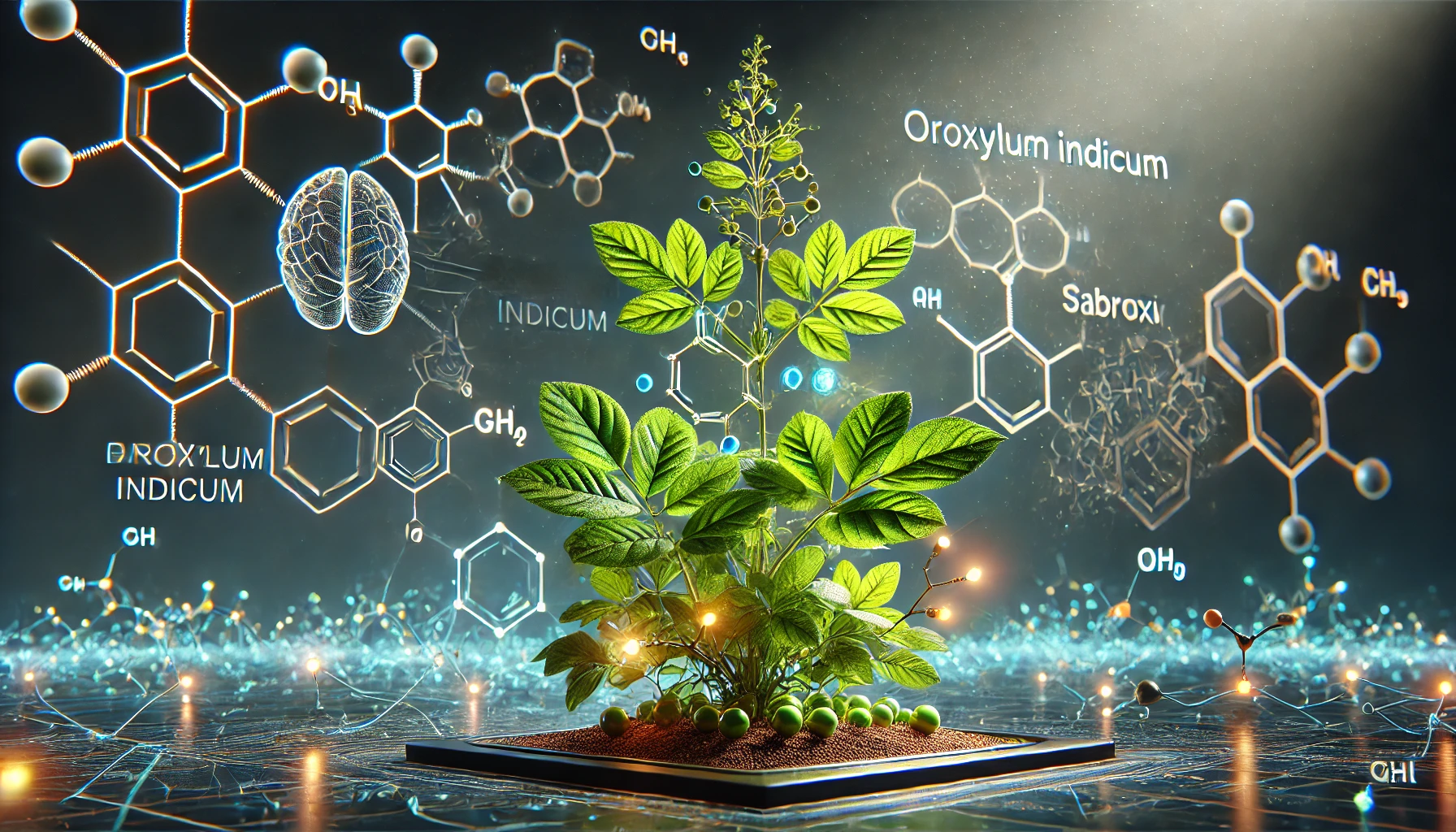

L-Tryptophan – Powder
- Category: Amino acids
Form
Quantity
| Quantity | Discounted price | DISCOUNT |
|---|---|---|
| 3-5 | €28.21 | 5%€1.49 |
| 6-9 | €27.32 | 8%€2.38 |
| 10+ | €26.73 | 10%€2.97 |
Change your country
- Your Biohacking Experts.
- Mo-Fr Same day shipping for orders before 17:00.
- Free shipping for orders above 75eu.
- Superior Quality high purity extracts and compunds.
- Quantity based discounts applicable.
Biohacking Core L-Tryptophan Capsules & Powder
Biohacking Core’s L-Tryptophan is a high-quality dietary supplement available in both capsules and powder forms, offering reliable purity and carefully controlled manufacturing.
Product Features
- Formats Available: Offered in easy-to-use capsules or versatile powder for personalized use.
- Purity Level: 99.50% pure L-Tryptophan, validated by independent analysis.
- Non-GMO & Allergen-Free: Guaranteed free from genetically modified organisms (GMO), allergens such as peanuts, fish, eggs, wheat, crustaceans, milk, soy, legumes, molluscs, sesame, cotton seeds, and hazardous materials like glass or metals. It is also free from irradiation and insect contamination.
- Quality Standards: Produced under strict ISO 9001:2015 certified quality management systems.
- FDA Registration: Manufactured at an FDA-registered facility (FDA No. 10448851318).
Manufacturing Process
Our L-Tryptophan undergoes a meticulous production process that includes:
- Initial filtration to remove impurities.
- Cooling crystallization to ensure purity and consistency.
- Treatment with activated carbon to further enhance purity.
- Centrifugal separation and drying to achieve the ideal moisture level.
- Double sieving process to standardize particle size (80 mesh) for optimal use.
- Passing through metal detection as a final quality control measure.
- Secure packaging in food-grade bags to preserve product integrity.
Usage Guidelines
Capsules: Take 1–2 capsules daily with water.
Powder: Mix 500mg (approximately 1/8 tsp) into beverages or food.
Consult a healthcare professional before use if pregnant, nursing, or on medication.
Packaging & Storage
Packaged securely to maintain freshness. Store sealed, dry, and protected from light at 2–8°C.
Disclaimer
This supplement does not replace a balanced diet or healthy lifestyle. Do not exceed the recommended dosage. Keep out of reach of children.
Scientific Context: L-Tryptophan
L-Tryptophan is classified as an essential amino acid, meaning it cannot be synthesized by the human body and must be obtained through dietary sources1. First isolated in 1901 by Frederick Gowland Hopkins through hydrolysis of casein protein, its molecular structure was later identified as part of foundational biochemical research2. This discovery established its role in protein synthesis and broader metabolic processes.
Dietary Sources and Biochemical Pathways
Natural dietary sources include turkey, oats, dairy products, eggs, and seeds. As a component of proteins, L-Tryptophan participates in two major metabolic pathways: serotonin synthesis and the kynurenine pathway. Approximately 95% of dietary L-Tryptophan is metabolized through the kynurenine pathway, which generates compounds involved in energy production and immune regulation3. The remaining 1-3% contributes to serotonin synthesis, a neurotransmitter studied for its roles in neural signaling4.
Research on Metabolic and Physiological Roles
Scientific literature has explored L-Tryptophan’s involvement in nutrient metabolism, particularly its conversion to nicotinamide adenine dinucleotide (NAD+), a coenzyme critical for cellular energy production5. Studies in murine models indicate endurance exercise modulates kynurenine pathway activity, favoring metabolites associated with reduced inflammation5. Human trials have observed elevated plasma L-Tryptophan levels post-exercise in trained individuals compared to untrained counterparts, though clinical implications remain under investigation5.
Research on fatigue perception in cyclists demonstrated a 4% reduction in subjective exertion scores with L-Tryptophan supplementation, though renal function and lipid profiles remained unaffected6. A 1988 study noted a 49.4% increase in exercise duration during treadmill tests, hypothesizing altered pain tolerance mechanisms7. Subsequent trials reported conflicting results, highlighting the need for further research on dosage and timing variables8.
Industrial Production and Quality Standards
Commercial L-Tryptophan is primarily produced via microbial fermentation using genetically modified Escherichia coli or Bacillus subtilis. This method yields ≥99.5% purity through downstream processing steps like crystallization and filtration. Fermentation-derived L-Tryptophan is preferred over synthetic alternatives due to fewer byproducts and higher enantiomeric purity. Industry standards often require compliance with ISO 9001 (quality management) and ISO 22000 (food safety) frameworks, though certifications apply only to specific production phases rather than end-product claims.
Historical and Regulatory Considerations
Following a 1989 outbreak of eosinophilia-myalgia syndrome linked to contaminated batches, regulatory agencies implemented stricter controls on L-Tryptophan manufacturing. Current EU regulations mandate third-party testing for impurities like 1,1′-ethylidenebis(L-tryptophan), ensuring adherence to food-grade safety thresholds. These measures have established L-Tryptophan as a low-risk supplement when produced under validated conditions.
This information is provided for educational purposes only and does not constitute medical advice. Always consult a healthcare professional before making dietary changes or beginning supplementation.
1. Pardridge, William M., and William H. Oldendorf. 1975. “Kinetic Analysis of Blood-Brain Barrier Transport of Amino Acids.” Biochimica et Biophysica Acta (BBA) – Biomembranes 401 (1): 128–36. https://doi.org/10.1016/0005-2736(75)90347-8
2. Oldendorf, William H. 1977. “The Blood-Brain Barrier.” Experimental Eye Research 25 (January): 177–90. https://doi.org/10.1016/s0014-4835(77)80016-x
3. Matarese, Laura E., and Michele M. Gottschlich, eds. Contemporary Nutrition Support Practice: A Clinical Guide. 2nd ed. Philadelphia: Saunders, 2003
4. Sainio, E. -L., K. Pulkki, and S. N. Young. 1996. “L-Tryptophan: Biochemical, Nutritional and Pharmacological Aspects.” Amino Acids 10 (1): 21–47. https://doi.org/10.1007/bf00806091
5. Boer, Johan A. den, and Herman G.M. Westenberg. 1990. “Behavioral, Neuroendocrine, and Biochemical Effects of 5-Hydroxytryptophan Administration in Panic Disorder.” Psychiatry Research 31 (3): 267–78. https://doi.org/10.1016/0165-1781(90)90096-n
6. Winokur, Andrew, Nicholas D. Lindberg, Irwin Lucki, Jennifer Phillips, and Jay D. Amsterdam. 1986. “Hormonal and Behavioral Effects Associated with Intravenousl-Tryptophan Administration.” Psychopharmacology 88 (2): 213–19. https://doi.org/10.1007/bf00652243
7. Javierre, C., R. Segura, J. L. Ventura, A. Suárez, and J. M. Rosés. 2010. “L-Tryptophan Supplementation Can Decrease Fatigue Perception during an Aerobic Exercise with Supramaximal Intercalated Anaerobic Bouts in Young Healthy Men.” International Journal of Neuroscience 120 (5): 319–27. https://doi.org/10.3109/00207450903389404
8. Segura, R., and J. Ventura. 1988. “Effect of L-Tryptophan Supplementation on Exercise Performance.” International Journal of Sports Medicine 09 (05): 301–5. https://doi.org/10.1055/s-2007-1025027
Latest Blogs
Stay Informed, Stay Ahead: Discover the Latest Insights in Biohacking

Sabroxy®: Research, Benefits & Effects
Sabroxy® is a relatively new product on the market that's been making some headlines recently. Unlike many popular nootropics, Sabroxy®...
Read More
Biohacking & Neurogenesis: The Essential Connection
Biohacking, or DIY biology, is a buzzword that was popularized over the past decade. In the literal sense of the...
Read More
PrimaVie® Shilajit: Research, Benefits & Effects
The market is full of countless substances touted for their positive impact on brain health, cognition, mood, energy levels, and...
Read More
Social Anxiety & Nootropics: Can They Help?
Regardless of who you are, how confident you consider yourself to be, or how much you communicate with others, you've...
Read More
Biohacking 101: What Is It and Why It Matters
While the term “biohacking” has gained momentum in recent years, its meaning can differ depending on the context in which...
Read More
Vitamin C & Brain Health: Optimize Your Intake
Like most, you’ve probably sought the assistance of compounds to optimize your cognition and brain health. Maybe you struggle with...
Read More
Level Up: Unearth Our Unsurpassed Quality!
CONTACT

0 reviews
Only logged in customers who have purchased this product may leave a review.